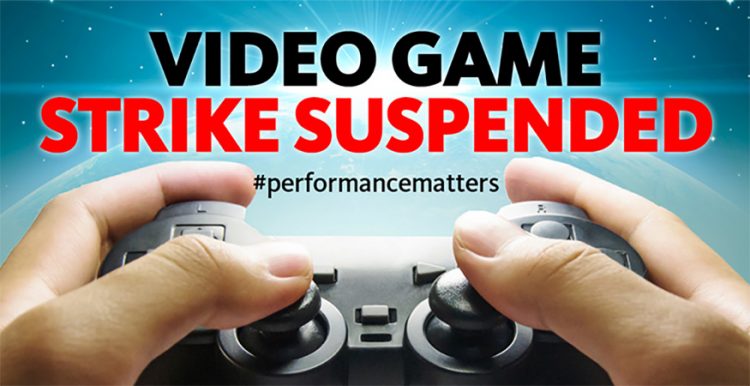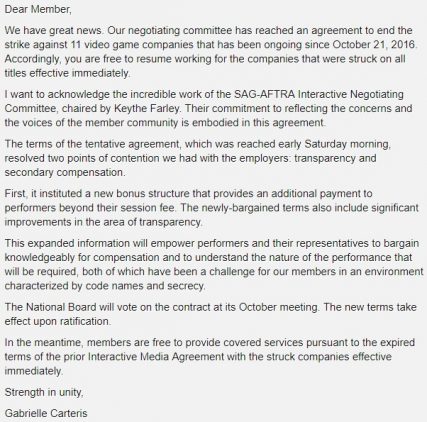The SAG-AFTRA strike against video game developers which has been going on for quite a while now, also known as the #PerformanceMatters protest, has been ended by the Union after it came to an agreement with Video Game Industry bodies on September 23, 2017. The SAG-AFTRA Union released the following statement to their members on September 25, 2017, 7:09pm:
The agreement, which will be voted on in the October meeting, contains some of the following agreements:
- The bonus payment, which is due no later than the release date of the game, is based on the number of sessions worked on each game, beginning with a $75 payment on the first session and totaling $2,100 after 10 sessions worked.
(Translation: Increase in rate of pay per session, getting higher the more sessions are required. Given that some games require 20-30+ sessions, this means a huge increase in payments to Voice Actors.) - The new transparency provisions will enhance the bargaining power of our members’ representatives by requiring the companies to disclose the code name of project, its genre, whether the game is based on previously published intellectual property and whether the performer is reprising a prior role.
(Translation: Developers will now have to disclose from the outset about what the game is, it’s history and if the Voice Actor has been used before, leading to the Voice Actor having a majority of the control when it comes to negotiating payment.) - Members are also protected by the disclosure of whether they will be required to use unusual terminology, profanity or racial slurs, whether there will be content of a sexual or violent nature and whether stunts will be required.
(Translation: Voice Actors will be made aware of the content of the game before signing on for a role. If they disagree with what the role contains, then they can either reject or request to have things rewritten. When it comes to motion capture, they can pick and choose what motion capture they do, leading to increased costs in that department.)
The agreement does not include several proposals sought by management, including a provision that would have fined performers for being late or distracted at session, another that would have required agents to submit performers for low-paying “atmospheric voice” sessions or face fines, and a possible revocation of their union franchise, and another that would have allowed employers to use their permanent staff to do covered work outside of the collective bargaining agreement.
“The bonus payments we have now are significantly larger now than what we had 11 months ago. And the existence of additional payments beyond your session fee is in the video game world for good, both in our high-budget and independent promulgated agreements,” said the chair of the SAG-AFTRA Interactive Negotiating Committee Keythe Farley. “Those are the victories that this strike has brought us.”
The agreement seems to be 100% on the side of Voice Actor’s union and leaving nothing for the Video Game Industry to do but roll over and do whatever the Union wants. There are ramifications to this agreement, which will possibly pass in the October meeting, leading to an increase in production costs for video games. This increase will have to come out of the budget somewhere, and at the end of the day it’s always the consumer that will end up paying for it. In the unlikely event that the industry absorbs these costs, expect quality to drop.
While this is a huge victory for video game voice actors like Ashley Burch, David Hayter, Elias Toufexis, Phil LaMarr and Wil Wheaton. (You know, those who have TV and Animation money to fall back on) The rest of us have to get ready for a possible hit to our wallets.



